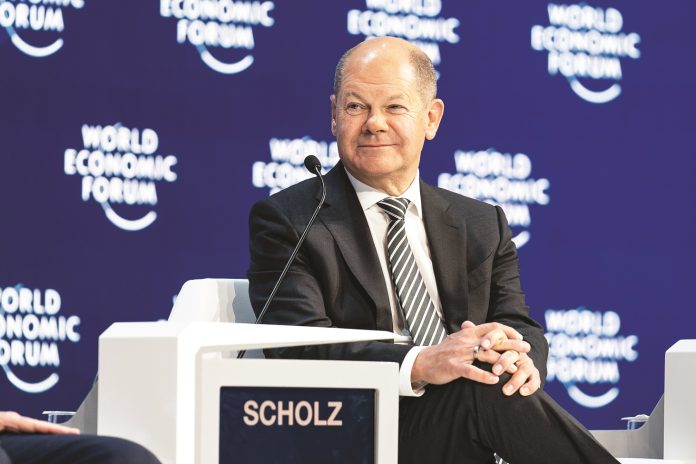‘Traffic light’ government quarrels and quarrels and quarrels….
Sascha Stanicic, Spokesperson, Sol (CWI in Germany)
When the first ever three-party coalition formed a German government in autumn 2021, big words were said. It would be a ‘progress coalition’ that would face the great challenges of the time, such as climate change and automation, and would not just tinker with small things. There is not much left of that. Instead, the ‘traffic light’ coalition of social democrats SPD, Greens and the liberal FDP is in a permanent dispute. But behind this is more than just different party political positions.
Finance minister Christian Lindner’s refusal to present so-called budget benchmarks to the deliberations on the 2024 federal budget is a unique event. Bids for additional spending totalling €70 billion from the individual ministries are being countered by an estimate of a 2024 deficit of €14-18 billion – excluding the hoped for €70 billion.
Lindner is therefore preparing the people for spending cuts: “This budget gap must be earned by doing without. If you then want to set additional spending priorities, for example in defence and education, then you have to cut more elsewhere.”
Not giving the ministries any guidelines in this regard is an expression of the acid test which these budget discussions could lead to, and possibly also of a hope that the tax estimate expected for this May could predict a somewhat smaller deficit.
‘Debt brake’
The debate also expresses a fundamental conflict within the coalition. While for Lindner, and probably also Chancellor Olaf Scholz, (re)observance of the ‘debt brake’ is a holy grail. The ‘debt brake’ is a law which from 2009 has strictly limited government borrowing; while it was lifted during the Covid pandemic it was re-imposed this year. However the SPD and the Greens now see it differently. SPD co-leader Lars Klingbeil says: “If in the end I’m faced with the question of whether we invest in security, social justice and economic awakening or cling to the ‘debt brake’, then I have a clear priority there.”
But given the rising record national debt of €2.5 trillion and the bleak economic outlook, no government – on a capitalist basis – will be able to continue as it has in recent years, when both the previous grand coalition and then the ‘traffic light’ government spent billions to cushion the effects of the pandemic and inflation, and to arm the military.
There could only be much higher revenues if there was either significant economic growth or drastic taxation of private profits and assets. Even though the opposition conservative CDU has recently expressed thoughts of raising the top tax rate and reforming inheritance tax, both are more than unlikely. What remains? Cut government spending. That is what it will come to, sooner or later. And the later that comes, the more drastic it will be.
Pro-capitalist priorities
The dispute over €12 billion additional expenditure for the planned basic child security is symbolic of the priorities of this pro-capitalist government. €100 billion extra in special funds for the military (and thus for the arms companies!) were decided with a stroke of the pen. Yet €12 billion for children is out of the question for the neoliberal firebrand Lindner.
In fact, however, many billions more are needed to get the ailing health and education systems back in shape, to effectively combat climate change or to bring people who depend on social benefit out of poverty. A pro-capitalist government will never mobilise this money, however, because it would require significantly touching the enormous profits and fortunes of corporations and the super-rich – 2022 was the record dividend year for shareholders.
However, as much as the SPD, the Greens and the FDP agree on not really asking the rich and powerful to pay, their differences are real and make this government a weak and unstable representative of the ruling capitalist class. These differences express partly different pro-capitalist ideas on how to deal with the tendency towards an economic crisis, partly the different social base of each party and the different fractions of capital they represent. However, there is no difference in principle on the question of which class interests they represent.
On the backs of the masses
So it is not surprising when the minister of health, Karl Lauterbach, proclaims a hospital reform that, despite some glossing over, will not fundamentally change the profit orientation of hospitals and may even lead to the closure of many clinics.
Nor is it a surprise when the state ministers of education want to worsen the working conditions for teachers. Or even when the head of the health service doctors’ association, Andreas Gassen, demands patients should pay a fee for visiting the emergency room in hospitals. Although this proposal was rejected by the government, it indicates which direction the course is to be set: the burdens of the crisis are to be dumped on the backs of the mass of the working population.
In this sense, the current budget debate is a warning light for sharp attacks on the rights and living standards of the working class in the future. When this will happen, no one can say. It cannot be said right now whether the capitalists will need another government for such attacks or whether the traffic light coalition will break apart before the election due in 2025. But that it will happen sooner or later is certain, and then there will be a reaction.







